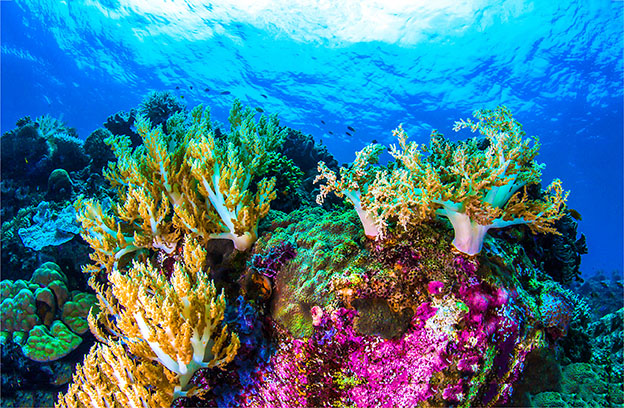

Coral reefs are complex ecosystems that are home to a wide variety of marine life. They are formed by the accumulation of calcium carbonate skeletons produced by coral polyps. Coral polyps are small, soft-bodied animals that live in colonies. They attach themselves to the ocean floor and secrete a hard skeleton around themselves. As the polyps grow, their skeletons build up, forming a reef.
Coral reefs are found in warm, shallow, clear, and sunny waters. They are most common in the tropics, but they can also be found in temperate waters. Coral reefs are important for a number of reasons. They provide a home for a wide variety of marine life, including fish, shrimp, crabs, and sea turtles. They also protect shorelines from erosion. Coral reefs are also important for tourism. Millions of people visit coral reefs each year to scuba dive, snorkel, and fish.
Coral reefs are threatened by a number of factors, including climate change, pollution, and overfishing. Climate change is causing the oceans to warm, which is causing coral bleaching. Coral bleaching occurs when the water temperature becomes too warm, and the coral polyps expel the algae that live in their tissues. This makes the coral appear white and unhealthy. Pollution from agricultural runoff, sewage, and industrial waste is also a major threat to coral reefs. This pollution can kill coral polyps and make it difficult for them to grow. Overfishing is another threat to coral reefs. When too many fish are caught, it can disrupt the ecosystem and make it difficult for coral polyps to survive.
It is important to protect coral reefs because they are an important part of the ocean ecosystem. They provide a home for a wide variety of marine life, and they also protect shorelines from erosion. We can help protect coral reefs by reducing our impact on the environment. We can do this by reducing our carbon emissions, reducing pollution, and practising sustainable fishing.
Coral reefs are important ecosystems that provide food and shelter for many marine animals.

The singular form is "coral reef." This is the most common form of the word, and it is used when referring to a single reef.
The plural form is "coral reefs." This form is used when referring to more than one reef.
The possessive form is "coral reef's." This form is used when the reef is possessed by something else. For example, you could say "the coral reef's ecosystem.".
The adjective form is "coral reef." This form is used to describe something that is related to a coral reef. For example, you could say "coral reef habitat.".
The word "coral reef" comes from the Old French word "corail," which in turn comes from the Latin word "corallium." The Latin word "corallium" is ultimately derived from a Semitic word meaning "small pebble." This is because the first corals to be known to Europeans were the red corals of the Mediterranean Sea, which are small and pebble-like.
What do you know about coral reef?
Question:
Explain the importance of coral reefs in marine ecosystems and the potential threats they are facing.
Answer:
Coral reefs are crucial and diverse ecosystems that play a vital role in marine environments. They provide habitat, breeding grounds, and shelter for a wide variety of marine organisms, supporting a vast range of biodiversity. Additionally, coral reefs act as natural barriers, protecting coastlines from erosion and reducing the impact of waves during storms.
However, coral reefs are facing significant threats. One of the most pressing concerns is coral bleaching, which occurs due to rising sea temperatures. When corals experience stress from elevated temperatures, they expel the symbiotic algae living within their tissues, leading to a loss of colour and eventually death. Climate change and human activities, such as pollution, overfishing, and coastal development, further exacerbate the situation.
The combination of these factors puts coral reefs at risk of degradation and potential collapse, which can have devastating consequences for marine ecosystems and the communities that depend on them. It is essential for us to take immediate action to protect and conserve these valuable ecosystems to ensure their survival for future generations.
Address
Developing Experts Limited
Exchange Street Buildings
35-37 Exchange Street
Norwich
NR2 1DP
UK
Phone
01603 273515
Email
hello@developingexperts.com
Copyright 2025 Developing Experts, All rights reserved.